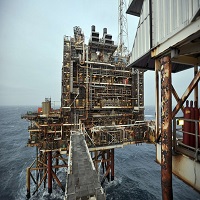
LONDON--Oil production in the British section of the North Sea declined in 2014 amid rising costs, high taxes and low oil prices, underscoring the need for more investment and exploration there, an industry association said Tuesday.
The report by Oil & Gas U.K., a lobbying group, comes as the oil industry has stepped up pressure on the U.K. government to cut taxes and streamline the complex regime for the oil and gas sector in its March budget amid the North Sea's decline.
British North Sea production fell by 1.1% in 2014 compared with the previous year to 1.42 million barrels of oil equivalent a day, the report said. That is down around 70% since the North Sea's peak in 1999.
Production could reach 1.43 million barrels a day this year if projects proceed as planned.
The North Sea began producing oil in the 1970s and became one of the world's great petroleum discoveries, introducing millions of new barrels a day to the market. One of its most productive fields, Brent, lent its name to the world benchmark for crude-oil prices.
However, in recent years, North Sea profit margins have progressively tightened amid rising costs and high taxes as its fields mature. Many of the remaining fields are old and mostly tapped out.
Newer fields are smaller and in harder-to-reach locations requiring more costly technology to extract.
The report notes that oil companies drilled only 14 exploration wells last year in the British part of the North Sea--significantly less than the around 70 exploration wells drilled in the nearby Norwegian sector, where the government offers generous tax incentives.
In December, U.K. Chancellor of the Exchequer George Osborne announced an immediate reduction in the rate of the supplementary charge on oil and gas company profits to 30% from 32%, but the move fell far short of industry hopes he would cut the levy to 20%.
Even before prices collapsed in 2014 and early this year--falling from $115 a barrel to less than $50 in January--oil companies, such as Chevron Corp., BG Group PLC and Statoil ASA, were already reassessing their investments in the North Sea.
Smaller companies that work on squeezing the last drops from older fields have been struggling to raise financing because of the lower oil prices and have also scaled back work.
Without their investment, there is a growing risk that a portion of the U.K.'s potentially recoverable reserves, estimated by Oil & Gas UK at up to 10 billion barrels of oil equivalent, won't be extracted. Of the 10 billion barrels, 3.7 billion barrels have yet to secure investment, the body said.
"At $50 a barrel, clearly there's a lot of investment that's not able to get going at the moment. We need to see something change on costs and tax before more investment can get under way," said Mike Tholen, economics director at Oil & Gas U.K.
Capital investment in the U.K. North Sea is expected to fall this year by as much as 36% to GBP9.5 billion to GBP11.3 billion from GBP14.8 billion in 2014 as investment in new projects dries up, Oil & Gas U.K. said.
Falling oil prices have meant that revenues for companies operating in the North Sea fell to just over GBP24 billion last year, the lowest since 1998. Combined with rising costs, the region experienced negative cash flow of GBP5.3 billion, the worst since the 1970s, Mr. Tholen said.
By
Selina Williams
Wall Street Journal
Feb. 23, 2015